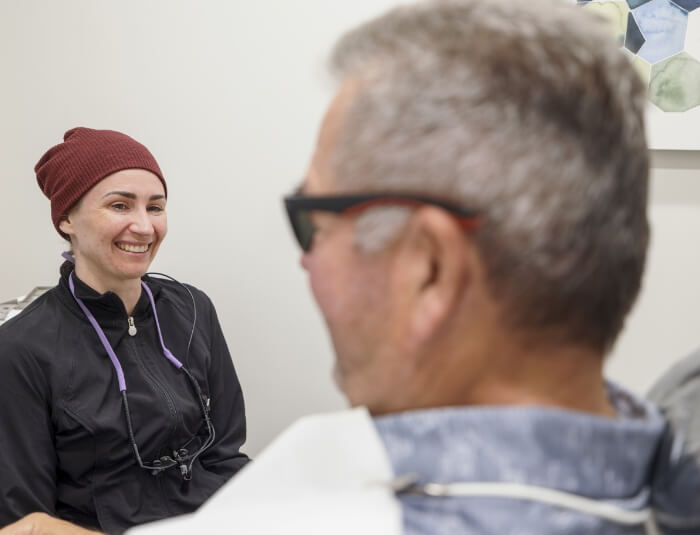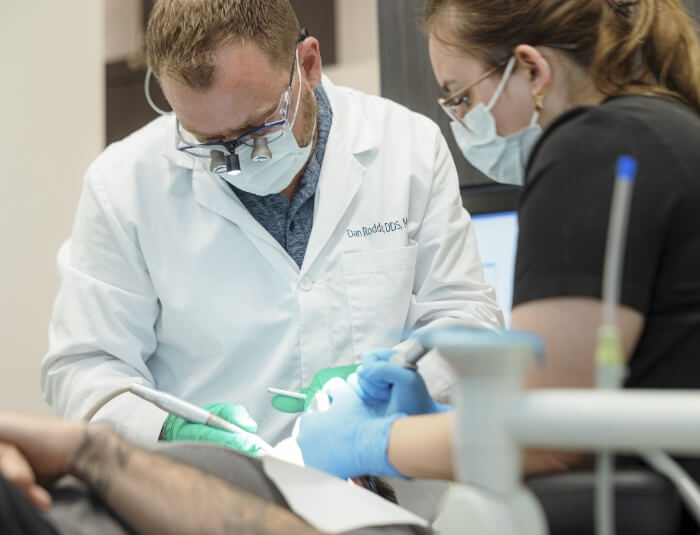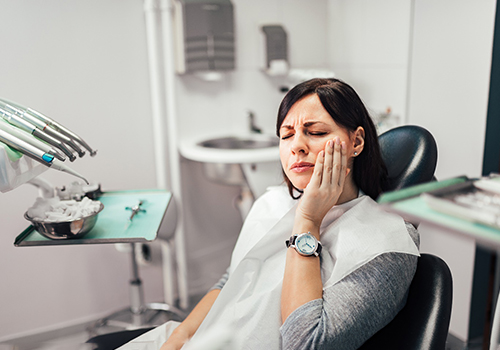Emergency Dentist – Phoenix, AZ
Need Help? It’s Here!


The very nature of a dental emergency is that it seems to come out of nowhere, meaning it’s impossible to plan for. Thankfully, the only “plan” required when you need an emergency dentist in Phoenix has one step: call Dr. Rodda at Complete Dental Care. He has extensive experience fielding dental emergencies, and our team works hard to see patients in pain as quickly as possible. From toothaches to knocked-out teeth and more, when you need help without delay, you can trust we’ll be here for you.
Why Choose Complete Dental Care for Emergency Dentistry?
- Same-Day Emergency Dental Appointments Available
- Multiple Dental Sedation Options
- Fast & Precise Relief Thanks to Advanced Technology
How We Treat Dental Emergencies
We recommend that you give us a call if you even think you’re dealing with a dental emergency. After we learn about your situation over the phone, we’ll schedule you for an appointment as soon as possible. Once you arrive, we’ll…
- Perform an exam to determine the source and extent of your emergency.
- Relieve your immediate pain.
- Go over our findings with you.
- Present your treatment options and discuss the associated costs.
- Follow through on the agreed-upon treatment plan to fix your problem.
- Schedule additional appointments as needed for further repairs.
The Most Common Dental Emergencies
The term “dental emergency” can be accurately applied to a wide variety of situations and problems, and here is a collection of the most common ones we see in our dental office:
Understanding the Cost of Dental Emergencies

When it comes to a dental emergency, getting treatment right away will ALWAYS cost you less in the long run compared to waiting. That’s because delaying treatment will only allow a dental problem to become worse, meaning it will require more extensive and expensive care. Acting fast is in the best interest of your health and wallet. Our team will also discuss how we can use your dental insurance and/or our in-house savings plan to make sure your treatment is easily affordable.
Keys to Preventing Dental Emergencies

A little bit of prevention goes a long way when it comes to avoiding a trip to the emergency dentist near Paradise Valley:
- Always wear a mouthguard when playing sports
- Don’t use your teeth as tools to open things
- Avoid chewing on ice or other extremely hard items
- Brush twice a day and floss once a day to stop cavities from forming
- Contact our dental office as soon as you start experiencing lingering mouth pain
Dental Emergency FAQs

So far, we’ve reviewed briefly how we handle dental emergencies, factors that impact the cost, and how to protect your smile from harm. If you want to learn more on the topic – whether it’s about where to turn for help or how to manage your discomfort in the meantime – then you can read on for the answers to FAQs about emergency dentistry! If you can’t find the answer you’re looking for below, you’re also welcome to give our team a call.
Should I visit the emergency room first for dental emergencies?
Since the ER doesn’t usually have a dentist on-staff, the answer is typically “no.” However, there is an important exception: if you are experiencing any potentially life-threatening symptoms. Bleeding that continues after 10 minutes, difficulty breathing, trouble swallowing, and a fractured jaw are a few examples of conditions that require immediate medical attention. After you’ve received the necessary treatment at the hospital and been discharged, you can call our Phoenix emergency dentist to schedule a same-day appointment to restore the look and function of your smile too.
How should I sleep with tooth pain?
We need to start this section by saying that the only way to get the long-term relief you need is by visiting us for the necessary restorative care. If, however, your appointment isn’t for another day or two, then you can use the following tips to help you sleep soundly:
- Don’t eat anything spicy, hard, or sugary for dinner.
- Take OTC pain medication about 30 minutes before bed.
- Place a cold compress against the outside of your cheek in 10-minute intervals.
- Prop up a few pillows so you can keep your head elevated while you sleep.
Do chipped teeth heal?
Unfortunately, the answer is “no.” To prevent your tooth from breaking further or, perhaps worse, from developing an infection, we recommend scheduling an appointment with us. Even if you aren’t in pain, this ensures that we can restore your tooth before you are!
Should knocked-out teeth be placed in water?
No, you shouldn’t place a knocked-out tooth in water. The best way to preserve the root is by submerging your tooth in a clean container of milk or placing it back in its socket (but only if it slides back into position without any force). It’s also important that you pick the tooth up by the crown, not the root, when transporting it.
Is my tooth pain from an infection?
Persistent tooth pain could be the result of several issues – from chronic teeth grinding and impacted wisdom teeth to TMJ dysfunction and a serious infection. That’s why we strongly recommend calling our Phoenix dental team when the discomfort first arises. The sooner you do, the sooner we can pinpoint what’s causing your pain and put a plan in place to alleviate it!
Can I pop a dental abscess on my own?
If you have a pimple-like bump on your gums, do not attempt to pop it at home. This dental infection necessitates professional treatment, and trying to handle it by yourself will only lead to further issues, like bacteria spreading to your neck and throat. So, call our office – we’ll walk you through what to do from there.

